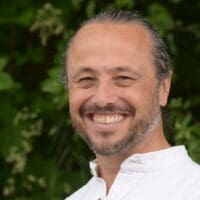Yoga is an ancient mind-body discipline practiced in various forms in different
Asian countries such as India and Tibet, with important contributions for contemporary society. The number of yoga practitioners in Western society is growing worldwide, in particular in the pursuit of mental well-being. Research shows that yoga techniques can improve emotional balance and strength, especially in vulnerable populations such as elders, cancer patients, and caregivers of the chronically ill. Both traditional texts and contemporary research suggest that there are physiological changes associated with the physical aspect of yoga (e.g., muscle stretches, breath regulation) as well as the mental/psychological components (e.g., relaxation and meditation). This session will highlight recent findings with neuroimaging, biomarkers, and psychological tests, and open a discussion of the contributions (or limitations) of using yoga as an intervention for well-being.

Alejandro Chaoul, PhD
Founding Director of the Jung Center’s Mind Body Spirit Institute
Convening Faculty, Fellow, Reviewer
Alejandro “Ale” Chaoul is a scholar, researcher, author, teacher, and educator, with a Ph.D from Rice University focusing on Tibetan mind-body practices and applications in contemporary health environments. For over … MORE




